The charts that matter: watching for the canary in the coalmine
Inflation is likely to be the big issue of the year. Here, John Stepek looks at how the global economy is faring with the charts that matter.

Get the latest financial news, insights and expert analysis from our award-winning MoneyWeek team, to help you understand what really matters when it comes to your finances.
You are now subscribed
Your newsletter sign-up was successful
Want to add more newsletters?

Twice daily
MoneyWeek
Get the latest financial news, insights and expert analysis from our award-winning MoneyWeek team, to help you understand what really matters when it comes to your finances.

Four times a week
Look After My Bills
Sign up to our free money-saving newsletter, filled with the latest news and expert advice to help you find the best tips and deals for managing your bills. Start saving today!
Welcome to your weekend edition, where we take a look through the charts that matter and catch up on anything else that we missed during the week.
But first, for podcast fans you'll (hopefully) be glad to know that the MoneyWeek podcast is finally back! Yesterday, Merryn and I recorded our first podcast of 2018 - and the first in a very long time indeed and you can listen to it here (alternatively, download it via your favoured podcast provider). I can't promise you high production values or consummate professionalism, but hopefully it gives an insight into our thought processes...
And if you missed any of this week's Money Mornings, here are the links to catch-up.
MoneyWeek
Subscribe to MoneyWeek today and get your first six magazine issues absolutely FREE

Sign up to Money Morning
Don't miss the latest investment and personal finances news, market analysis, plus money-saving tips with our free twice-daily newsletter
Don't miss the latest investment and personal finances news, market analysis, plus money-saving tips with our free twice-daily newsletter
Monday: What happens before a market melts down? It melts up, of course Tuesday: Some thoughts on the bitcoin bubble and when it will burst Wednesday: The outlook is brightening for gold Thursday: Has the bond bear market finally started? Friday: Global housing markets are warning that the cheap money is running out
Inflation, of course, is the big issue of the year, and we have more signs that it's budding this week. US supermarket giant Walmart (one of America's largest employers) is raising its minimum wage to $11 an hour from February. It's the third such increase since 2015. There will also be a one-off cash bonus of up to $1,000, depending on length of service, as well as expanded maternity and parental leave.
The company noted that it will save a fortune from the new reduced US corporation tax rate, which is one reason that it can afford to do this (retailers are among the companies that benefit the most from the Trump tax cut because most if not all of their business tends to be domestically located).
But of course, it wouldn't be doing this if it didn't feel it had to (this isn't cynicism, I'm just pointing out that big companies are not typically in the business of raising pay and conditions for staff if they don't feel any need to). With unemployment as low as it is, competition for staff is getting tougher and so offering both higher wages and retention benefits (like better parental leave, something that is not common in the US) is something worth doing.
Meanwhile, US consumer price inflation rose more rapidly than expected. The Federal Reserve's preferred measure of "core inflation" which excludes fuel and food prices rose by 1.8% in the year to December. The monthly rise of 0.3% was the strongest rise in 11 months.
It's all just little trickles for now. Small enough so that no one gets overly worried, and no one quite has to let go of their disinflation, demographics, digitalisation narratives for now.
But there'll be a tipping point, and when it comes, you won't want to be in the way of the market reaction.
Let's move onto the charts.
Gold has continued its solid start to the new year. Dominic wrote about it earlier this week, but the yellow metal is basically benefiting from having had a mediocre year last year, from commodities being cheap, from the US dollar being weak, and from inflation being a new concern (although equally, signs of rising inflation may well dent gold in the early stages because people still believe the Fed might react to catch up).
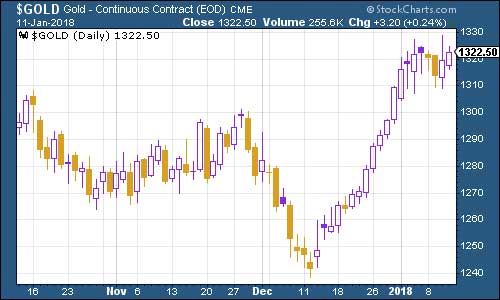
(Gold: three months)
The US dollar index a measure of the strength of the dollar against a basket of the currencies of its major trading partners remained pretty flat this week. Again, a big driver of this is euro strength. The latest minutes from the European Central Bank suggested that a shift towards tapering might be on the way sooner than expected, but more importantly, it looks as though Germany might finally manage to form a government under chancellor Angela Merkel.
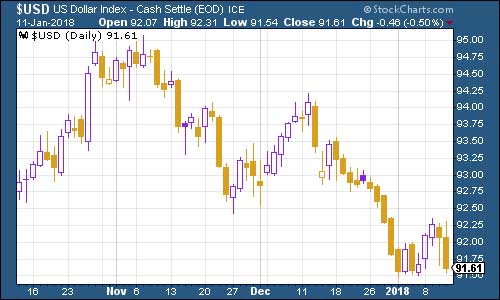
(DXY: three months)
The bond bulls are becoming a little less sceptical about inflation. The yield on ten-year US Treasury managed to claw its way up as high as 2.59% in the wake of the US CPI data, which came out on Friday afternoon. Bill Gross already thinks we're now in a bear market for bonds, and for Jeff Gundlach (the current "bond king"), while we're not quite there yet, the next really big landmark is 2.63% (the peak seen last April).
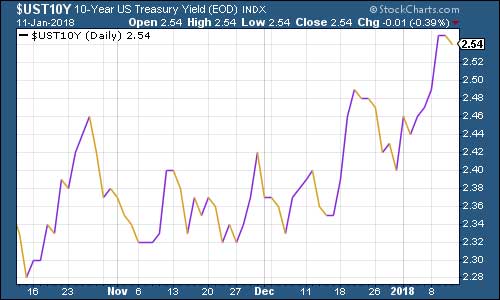
(Ten-year US Treasury: three months)
Now for an addition to our charts that matter this time the yield on the ten-year German bund. This the borrowing cost of Germany's government essentially represents Europe's "risk-free" rate. As you can see from the ten-year chart below, it's fallen a long way in a decade, and it's also a lot lower than the US equivalent (there's a large "spread" - or gap - between them).
However, it has taken off this week amid the hawkishness in Europe and the inflation in the US. I wouldn't be surprised if it starts to close that spread with the US Treasury quite significantly.
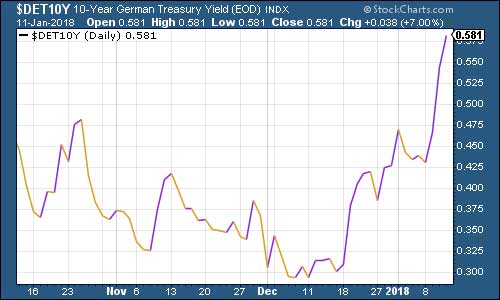
(Ten-year bund yield: three months)
Copper has been fairly flat this week, but it doesn't show much sign of giving back its recent gains.
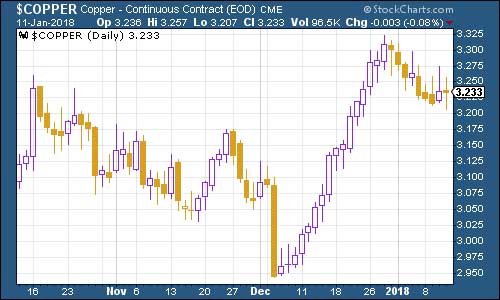
(Copper: three months)
Bitcoin has had one of its harder weeks. The cryptocurrency has been falling for most of the week, partly down to a concerted run of bad news on the government regulation front China now wants to shut down bitcoin mining operations, and South Korea is considering a crackdown too, though ultra-tech-savvy citizens are not so keen, crashing the government website with an online petition in reaction.
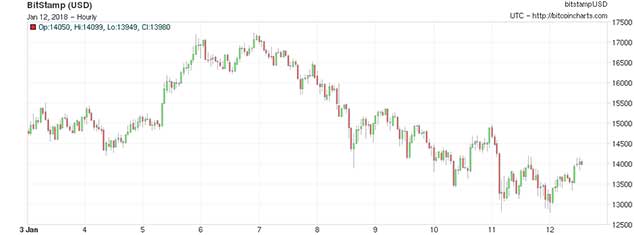
(Bitcoin: ten days)
Dominic wrote about bitcoin this week, and we also had an interesting discussion on it at the most recent MoneyWeek roundtable which you can read on the website.
As for US employment the non-farm payroll figures came in at 148,000 for December,missing expectations. But the indicator we prefer to keep an eye on is the four-week moving average of weekly US jobless claims, which rose to 250,750 this week, while weekly claims rose sharply to 261,000, versus expectations for 245,000.
This is a volatile period though, so I wouldn't read too much into the jump as yet - jobless claims are still well below the 300,000 level associated with a strong jobs market, and have been sitting there now for 149 weeks - the longest such period since 1970. According to David Rosenberg of Gluskin Sheff, when US jobless claims hit a "cyclical trough" (as measured by the four-week moving average), a stockmarket peak is not far behind (on average 14 weeks), a recession follows about a year later.
As the chart below shows, the most recent cyclical trough was in November, at 231,250. So we could still be some way from the peak.
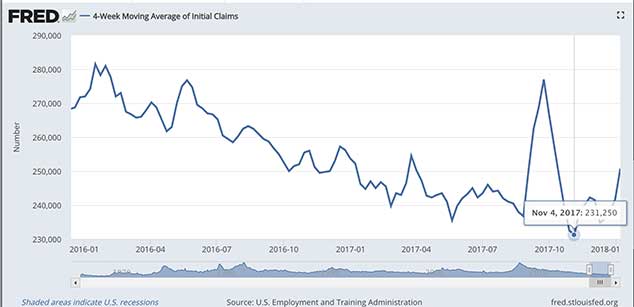
(Four-week moving average of US jobless claims: since start of 2016)
The oil price (as measured by Brent crude, the international/European benchmark) is no longer in a "stealth" bull market, I think it's fair to say. It just keeps climbing and hit its highest level since 2014 this week, as it breached the $70 a barrel mark.
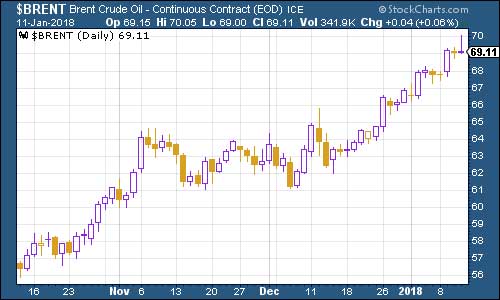
(Brent crude oil: three months)
Internet giant Amazon had a strong move higher this week - brokers still love it and there are now several with price targets around the $1,400 mark.
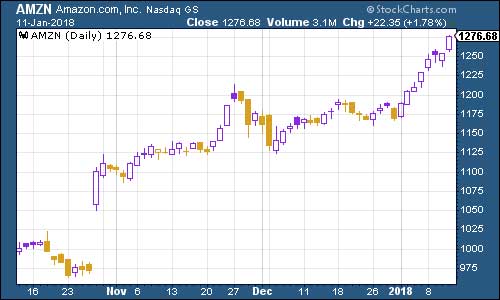
(Amazon: three months)
And Tesla, which is perhaps the ultimate faith-based asset on the planet right now and I'm including bitcoin when I say that - had a great week. Technical analysts look at the charts and reckon that it could be heading for a fresh high, while fundamental analysts simply can't find anything to say about the stock that could justify it. When that situation comes about, the technical guys are usually right, because any justification will do - of course, that only works until they're wrong, and then it gets ugly.
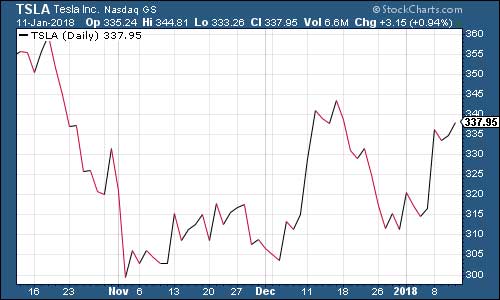
(Tesla: three months)
Get the latest financial news, insights and expert analysis from our award-winning MoneyWeek team, to help you understand what really matters when it comes to your finances.

-
 Should you buy an active ETF?
Should you buy an active ETF?ETFs are often mischaracterised as passive products, but they can be a convenient way to add active management to your portfolio
-
 Power up your pension before 5 April – easy ways to save before the tax year end
Power up your pension before 5 April – easy ways to save before the tax year endWith the end of the tax year looming, pension savers currently have a window to review and maximise what’s going into their retirement funds – we look at how